Can Omega-3 Fatty Acids Help with Mood Disorders?
Introduction
In today’s world of fast-paced living and processed diets, mental health struggles like anxiety, depression, and mood instability are becoming increasingly common. While therapy and medication are vital tools for many, there’s a growing interest in nutritional psychiatry — the study of how what we eat impacts how we feel.
Among the most researched nutrients for brain and emotional health are omega-3 fatty acids. These essential fats are not just “good for the heart” — they are deeply involved in brain structure, neurotransmitter function, and inflammation regulation, all of which affect mood.
Could these humble fats from fish oil, algae, or flaxseeds really help lift the fog of depression and bring emotional balance? Let’s explore what the science says, how omega-3s work in the brain, and how you can use them to support mood naturally.
Looking for supplements for Brain Fog? Click here.
🌊 What Are Omega-3 Fatty Acids?

Omega-3s are a type of polyunsaturated fatty acid that the body cannot produce on its own — meaning we must get them from diet or supplements. There are three main types relevant to human health:
ALA (Alpha-linolenic acid) – Found in plant sources like flaxseeds, chia seeds, and walnuts. The body can convert small amounts of ALA into DHA and EPA, but this process is very limited (less than 10%).
EPA (Eicosapentaenoic acid) – Found mainly in fatty fish and fish oil. EPA has strong anti-inflammatory effects and is closely linked to mood regulation.
DHA (Docosahexaenoic acid) – Also abundant in fish oil and algae. DHA is essential for brain structure, forming a major part of neuronal cell membranes.
Both EPA and DHA are critical for mental health — and deficiencies in these can lead to neuroinflammation, impaired neurotransmission, and even structural brain changes.
🧬 Why the Brain Loves Omega-3s
Your brain is nearly 60% fat, and omega-3s make up a significant portion of that. DHA, in particular, helps keep brain cell membranes flexible and fluid — allowing neurotransmitters like serotonin and dopamine to move efficiently between neurons.
When omega-3 levels are low, those cell membranes become rigid and less responsive, which can interfere with signaling pathways and mood regulation.
In addition, omega-3s:
Reduce neuroinflammation (a key factor in depression and anxiety)
Support the growth of new neurons and synapses (neuroplasticity)
Protect the brain from oxidative stress
Modulate stress hormone (cortisol) activity
Essentially, omega-3s help the brain function smoothly, adaptively, and calmly — the biochemical foundation of a stable mood.
😔 The Link Between Omega-3 Deficiency and Mood Disorders
A growing body of research suggests that people with depression, bipolar disorder, and even ADHD tend to have lower blood levels of omega-3s — particularly EPA and DHA.
🔹 Depression
Populations with higher fish consumption tend to have lower rates of depression.
People with major depressive disorder often have reduced EPA and DHA levels in the blood and brain tissue.
Omega-3 supplementation has been shown to improve mood, especially when combined with antidepressant therapy.
🔹 Bipolar Disorder
Some studies show omega-3s may help stabilize mood swings, reduce depressive episodes, and improve overall functioning in bipolar disorder — though results vary by individual and EPA/DHA ratio.
🔹 Anxiety and Stress
Omega-3s appear to lower stress hormones and reduce symptoms of chronic anxiety by supporting the parasympathetic (calming) nervous system.
They also improve resilience against everyday stress by reducing systemic inflammation and improving sleep.
In short, omega-3 deficiency doesn’t necessarily cause mood disorders — but it often amplifies them.
🔬 How Omega-3s Influence Mood Biochemistry
Boosting Serotonin and Dopamine
EPA and DHA enhance the fluidity of neuronal membranes, making it easier for serotonin (the “feel-good” neurotransmitter) to bind to its receptors.
EPA, in particular, also influences dopamine signaling, improving motivation, focus, and reward sensitivity — all commonly blunted in depression.
Reducing Inflammation in the Brain
Chronic inflammation in the brain is now recognized as a major driver of mood disorders. It disrupts neurotransmitter balance and interferes with neurogenesis (the growth of new brain cells).
EPA acts as a natural anti-inflammatory, producing compounds that reduce cytokines — the inflammatory molecules associated with depression and fatigue.
This mechanism is so powerful that some researchers describe depression as, in part, an “inflammatory condition of the brain,” with omega-3s as a potential anti-inflammatory remedy.
Regulating the HPA Axis (Stress Response System)
The hypothalamic-pituitary-adrenal (HPA) axis governs your body’s stress response. When it’s overactive, cortisol levels rise and emotional resilience drops.
Omega-3s help normalize HPA axis activity, lowering stress hormone output and improving how you cope with daily pressures — reducing “emotional reactivity.”
Supporting Neuroplasticity
DHA plays a direct role in neuroplasticity — the brain’s ability to rewire and adapt after stress or trauma.
Low DHA is linked with reduced hippocampal volume (the brain region tied to memory and emotional regulation). By restoring DHA, omega-3s can promote cognitive clarity and emotional flexibility.
📚 What the Research Says: Clinical Findings
The scientific consensus is clear — omega-3s play an important role in mental health. Here are some highlights:
A 2019 meta-analysis in Translational Psychiatry found that omega-3 supplementation significantly reduced depressive symptoms, especially in individuals with major depressive disorder.
EPA appears more effective than DHA in improving mood symptoms. Ratios with higher EPA (60–80%) show the best outcomes.
A 2021 systematic review found that omega-3 supplementation can improve anxiety and stress resilience across multiple populations.
In bipolar disorder, omega-3s are particularly beneficial during depressive phases but less effective during mania.
While not a replacement for therapy or medication, omega-3s are increasingly recommended as an adjunct treatment for mood disorders by many psychiatrists.
🥗 Food Sources of Omega-3 Fatty Acids
To get omega-3s naturally, include these foods regularly in your diet:
🐟 Rich Sources of EPA and DHA
Salmon (wild-caught)
Sardines
Mackerel
Anchovies
Trout
Herring
🌿 Plant Sources of ALA (convertible to EPA/DHA)
Flaxseeds and flaxseed oil
Chia seeds
Walnuts
Hemp seeds
Algal oil (vegan source of DHA and EPA)
💊 Omega-3 Supplements: What to Know
If you don’t eat fish regularly, supplements are a convenient and effective option. But not all omega-3 products are created equal.
🔹 Types of Omega-3 Supplements
Fish Oil – The most common, containing both EPA and DHA.
Krill Oil – More bioavailable due to phospholipid structure and includes antioxidants like astaxanthin.
Algae Oil – A vegan-friendly source of DHA and EPA, sustainable and mercury-free.
🔹 Optimal Dosage for Mood Support
General wellness: 500–1,000 mg combined EPA + DHA daily
Mild to moderate depression or anxiety: 1,000–2,000 mg daily
Clinical mood disorders: 2,000–3,000 mg daily (with doctor supervision)
Most experts suggest a ratio of at least 2:1 EPA to DHA for emotional balance. Look for high-quality, third-party tested supplements to ensure purity and potency.
Looking for supplements for Brain Fog? Click here.
⚖️ Omega-3 and Antidepressants: A Synergistic Approach
Omega-3s can safely complement most antidepressant medications. In fact, studies show they can enhance antidepressant response, particularly selective serotonin reuptake inhibitors (SSRIs).
This synergy likely occurs because omega-3s improve cell membrane dynamics, allowing serotonin receptors to function more efficiently.
However, always discuss supplementation with your healthcare provider, especially if you take blood thinners, as omega-3s have mild blood-thinning properties.
💭 Who Might Benefit Most from Omega-3 Supplementation?
While nearly everyone can benefit from omega-3s, certain groups are especially at risk of deficiency and emotional imbalance:
People with depression or anxiety
Those with bipolar disorder (especially depressive phases)
Individuals with ADHD or cognitive fatigue
Vegans or vegetarians (low DHA intake)
Pregnant or postpartum women (omega-3s support maternal mood and baby brain development)
Older adults (omega-3s help preserve brain volume and prevent mood decline)
Lifestyle Practices That Complement Omega-3s
Omega-3s work best as part of a holistic mental health plan. Here’s how to enhance their mood-regulating effects:
Mindful Breathwork
Deep breathing activates the vagus nerve, which communicates with the gut and brain. This supports relaxation, reduces inflammation, and complements omega-3s’ anti-stress effects.
Try box breathing:
Inhale for 4 seconds
Hold for 4 seconds
Exhale for 4 seconds
Hold for 4 seconds
Repeat 5–10 times.
Anti-Inflammatory Diet
Combine omega-3s with antioxidants, polyphenols, and fiber-rich foods. Focus on:
Berries 🍓
Leafy greens 🥬
Olive oil 🫒
Turmeric 🌿
These foods reduce oxidative stress — one of the root causes of mood disorders.
Regular Movement
Exercise naturally boosts serotonin, dopamine, and endorphins. When combined with omega-3s, it enhances neuroplasticity and improves long-term resilience.
Sunlight and Vitamin D
Vitamin D works synergistically with omega-3s to regulate serotonin synthesis. Low levels of both have been linked to depression.
Sleep and Recovery
Omega-3s help improve sleep quality by regulating melatonin production and reducing nighttime inflammation. Prioritize 7–9 hours of restful sleep each night.
🌱 For Vegans and Vegetarians: Algae Oil Options
If you avoid fish, algal oil is your best friend. It provides both DHA and EPA directly from marine algae — the same source fish get theirs from.
Vegan omega-3 supplements have improved dramatically in quality, offering potent and sustainable alternatives that match fish oil in effectiveness.
🔍 What to Look for in a Quality Omega-3 Supplement
When choosing a supplement, keep these criteria in mind:
High EPA:DHA ratio – At least 2:1 for mood support.
Purity and testing – Look for third-party certification (IFOS, USP, or NSF).
Form – Triglyceride or phospholipid form for better absorption (avoid ethyl ester).
Freshness – Omega-3s can oxidize easily; check for added antioxidants like vitamin E.
Source – Sustainable fisheries or non-GMO algae sources preferred.
🌤️ Real-Life Impact: What People Report
Many individuals who start supplementing with omega-3s notice subtle but powerful shifts after 4–8 weeks:
Less irritability
Improved emotional balance
Better focus and mental clarity
Reduced anxiety or intrusive thoughts
More stable energy throughout the day
These improvements often come quietly — not as a sudden “high,” but as a sense of inner steadiness and resilience.
⚠️ Possible Side Effects (and How to Avoid Them)
Omega-3s are generally safe and well-tolerated, but a few mild effects can occur:
Fishy aftertaste or burps (choose enteric-coated or algae-based oils)
Mild stomach upset (take with food)
Slightly thinner blood (caution with anticoagulants)
Taking supplements in divided doses (morning and evening) can improve comfort and absorption.
🧩 The Gut-Brain Connection: Omega-3s and Microbiome Health
Omega-3s don’t just act in the brain — they also reshape the gut microbiome, which communicates directly with mood centers via the gut-brain axis.
Research shows that EPA and DHA can:
Increase beneficial bacteria like Lactobacillus and Bifidobacterium
Reduce intestinal inflammation
Enhance short-chain fatty acid (SCFA) production, which supports serotonin synthesis
This means omega-3s help regulate mood from the gut outward, aligning with the holistic philosophy of modern mental wellness.
🧘 A Daily Routine for Mood Balance with Omega-3s
Here’s an example of how to integrate omega-3s into your day naturally:
| Time | Habit | Purpose |
|---|---|---|
| Morning | Take omega-3 supplement with breakfast (healthy fats improve absorption) | Start your day with a calm focus |
| Afternoon | Eat a fatty fish meal or plant-based omega-rich salad | Maintain consistent levels |
| Evening | Short breathwork or journaling session | Reduce stress and enhance neuroplasticity |
Pair with magnesium, vitamin D, or B-complex vitamins for extra synergy.
🌈 The Big Picture: Omega-3s as Emotional Nutrition
Omega-3 fatty acids remind us that mental health is not just psychological — it’s biochemical too. The fats you consume shape your emotional landscape on a cellular level.
By restoring omega-3 balance, you’re not just fueling your brain — you’re rebuilding emotional resilience, one neuron at a time.
These nutrients work quietly behind the scenes to support neurotransmission, reduce inflammation, and create a calm, focused state of mind. Over time, this translates into more patience, clarity, and emotional stability.
🧭 Final Thoughts: Can Omega-3s Really Help Mood Disorders?
Yes — while they’re not a standalone cure, the evidence is overwhelming that omega-3 fatty acids can significantly support emotional health.
They complement therapy, medication, and lifestyle practices beautifully — addressing one of the biological roots of mood disorders rather than just the symptoms.
Whether you’re struggling with depression, anxiety, or chronic stress, think of omega-3s as part of your foundation for emotional strength — a daily act of nourishment for both body and mind.
Want to try Breathwork? Click Here.
📚 References
Grosso, G. et al. (2014). Role of omega-3 fatty acids in the treatment of depressive disorders. Frontiers in Psychiatry, 5, 190.
Su, K. P. et al. (2018). Omega-3 fatty acids in major depressive disorder. Molecular Psychiatry, 23(8), 1725–1735.
Liao, Y. et al. (2019). Efficacy of omega-3 PUFAs in depression: A meta-analysis. Translational Psychiatry, 9(1), 190.
Martins, J. G. (2009). EPA but not DHA appears to be responsible for the efficacy of omega-3 fatty acids in depression. Journal of the American College of Nutrition, 28(5), 525–542.
Bazinet, R. P., & Layé, S. (2014). Polyunsaturated fatty acids and their metabolites in brain function and disease. Nature Reviews Neuroscience, 15(12), 771–785.*
Related Posts
-

Nootropics That Promote Calm and Rest
Explore the world of calming nootropics — natural brain enhancers that promote relaxation, better focus, and deeper rest. Learn how L-Theanine, magnesium, ashwagandha, and other adaptogens help balance your nervous system, reduce stress, and support restorative sleep.
-

Best Natural Supplement Stack for Sleep
Discover the best natural supplement stack for deep, restorative sleep. Learn how nutrients like magnesium, L-theanine, glycine, and calming herbs such as chamomile and ashwagandha work together to relax your body, calm your mind, and improve sleep quality—naturally and safely.
-

Combining L-Theanine and Magnesium for Sleep: A Calm Night, Naturally
Discover how combining L-Theanine and Magnesium can help you drift into deep, restorative sleep. Learn how this natural duo calms the mind, relaxes the body, and supports your nervous system—without grogginess the next morning.
-

How to Sleep Better After Intense Workouts
Struggling to fall asleep after a tough workout? Learn how to optimize your post-training recovery with nutrition, hydration, and science-backed sleep strategies. Discover how to calm your nervous system, balance hormones, and wake up fully recharged for your next session.
-

Ashwagandha and Valerian: A Bedtime Combo for Deep Rest and Emotional Reset
Discover the calming synergy of Ashwagandha and Valerian root, two natural sleep aids that help quiet the mind, ease anxiety, and promote deeper rest. Learn how this herbal duo supports the nervous system, balances stress hormones, and restores emotional peace — without next-day grogginess.
-

How to Create a Resilience-Boosting Diet
Discover how to build emotional and physical strength from the inside out with a resilience-boosting diet 🍎. Learn which foods stabilize your mood, how supplements like magnesium and omega-3s strengthen your stress response, and why pairing nutrition with breathwork and therapy creates lasting calm, focus, and vitality 🌿💪.
-

Best Teas and Herbal Blends for Calmness: Nature’s Way to Restore Inner Peace
Ashwagandha, the ancient adaptogenic herb, helps your body find balance during stress. Known as “Indian ginseng,” it supports cortisol regulation, boosts energy, and restores calm clarity. Discover how this powerful root promotes resilience, emotional balance, and steady vitality — one cup at a time. 🌸
-

Parenting and Emotional Strength: How to Raise Children Without Losing Yourself
Empathy is the bridge that connects hearts — the quiet power to understand, feel, and support another’s emotions without judgment. Learn how empathy strengthens relationships, enhances communication, and cultivates deeper compassion in everyday life. 🌿
-

How to Bounce Back from Public Failure: Reclaiming Confidence, Purpose, and Power
Visualization is more than imagination — it’s brain training for resilience. By picturing calm, success, or healing, you activate the same neural pathways as real experience. Learn how daily visualization rewires your brain for confidence, emotional balance, and recovery from stress. ✨
-

Coping with Financial Stress Through Resilience: How to Stay Grounded When Money Feels Tight
Body awareness is the foundation of emotional resilience. By tuning into your body’s signals — tension, fatigue, or calm — you learn to recognize stress before it overwhelms you. Discover how mindfulness, gentle movement, and breathwork can deepen your connection with your body and restore balance from the inside out. 🧘
-

How to Stay Positive During Chronic Illness: A Guide to Emotional Strength and Hope
Creativity is more than art — it’s a form of healing. Whether through painting, writing, music, or small acts of expression, creativity helps release emotion, calm the nervous system, and reconnect you to joy. Discover how to use creativity as a tool for emotional balance, resilience, and self-discovery. 🌿
-

Resilience Tips for Caregivers: How to Stay Strong While Caring for Others
Joy isn’t the absence of pain — it’s the quiet strength to find light even in challenging times. Cultivating joy through small daily moments restores balance, releases stress, and reminds you of life’s beauty. Learn how to reconnect with authentic happiness, rebuild emotional energy, and nurture your nervous system through gratitude, presence, and play. 🌿
-

Building Resilience After a Breakup: How to Heal, Rebuild, and Rise Stronger
Social connection is one of the strongest predictors of emotional resilience. During difficult times, genuine relationships act as anchors — calming the nervous system, reducing stress hormones, and helping you regain perspective. Learn how cultivating real human connection can strengthen your mind, heart, and overall well-being. 🌿
-

How to Stay Emotionally Strong During Job Loss
Your emotions are powered by brain chemistry — a delicate balance of neurotransmitters like serotonin, dopamine, and cortisol. When these chemicals work in harmony, you feel calm, focused, and resilient. Learn how daily habits, nutrition, and mindfulness can support your brain chemistry and boost emotional well-being naturally. 🌿
-

The Role of Hormones in Emotional Stability: How Your Chemistry Shapes Your Calm
Hormones shape more than your body — they shape your emotions, resilience, and sense of calm. From cortisol to serotonin, these chemical messengers influence how you react to stress, connect with others, and recover from challenges. Learn how to balance your hormones naturally to build lasting emotional stability and harmony within. 💫
-

Mitochondria and Emotional Energy: The Cellular Power Behind Your Mood
Breathwork is one of the most powerful tools for emotional regulation and cellular balance. Through intentional breathing, you can calm your nervous system, increase oxygen flow to the brain, and even support mitochondrial energy. Learn how conscious breathing connects body and mind — transforming stress into presence and emotional strength. 🌿
-

Inflammation and Its Impact on Mood Resilience: The Silent Link Between Body and Mind
Inflammation doesn’t just affect the body — it impacts the mind. Chronic inflammation alters brain chemistry, depletes serotonin, and makes emotional recovery harder. Learn how calming inflammation through nutrition, mindfulness, and sleep can restore balance, resilience, and a renewed sense of emotional strength. 💫
-

How Antioxidants Protect Emotional Well-being: The Hidden Link Between Oxidative Stress and Mental Health
Antioxidants do more than protect your body — they defend your mind. By neutralizing oxidative stress, antioxidants support serotonin, dopamine, and brain energy pathways that keep you calm, focused, and emotionally balanced. Discover how foods like berries, green tea, and dark chocolate nourish your brain, boost mood, and strengthen resilience from the inside out. 🌿✨
-

The HPA Axis and Emotional Health: The Hidden Bridge Between Stress and Mind
Neuroplasticity — the brain’s ability to rewire and adapt — is the foundation of emotional healing and resilience. When you face stress, trauma, or change, your neural pathways can reshape themselves to support new patterns of calm, focus, and self-awareness. Learn how daily practices like mindfulness, therapy, and breathwork strengthen neuroplasticity to transform emotional pain into personal growth. 🌸
-

Why Cortisol Control Is Key to Resilience: Mastering Stress to Build Emotional Strength
Controlling cortisol — the body’s main stress hormone — is the secret to lasting resilience. When cortisol levels stay balanced, your mind becomes clearer, emotions steadier, and energy more sustainable. Learn how breathwork, mindset shifts, adaptogens, and daily rhythms can help you calm your stress response and build true inner strength. 🌞💪
-

Dopamine’s Influence on Motivation and Recovery: Reigniting Drive and Balance
Healthy relationships are the foundation of emotional balance and resilience. Whether romantic, familial, or platonic, genuine connection releases dopamine, serotonin, and oxytocin — the brain’s “bonding trio” — helping us feel secure, motivated, and seen. Learn how trust, empathy, and communication not only strengthen your connections but also reshape your nervous system for deeper emotional well-being. 🌿🤝
-

The Role of Serotonin in Resilience: How This “Mood Molecule” Shapes Emotional Strength
Serotonin — often called the “resilience molecule” — plays a vital role in how we handle stress, regulate mood, and recover from emotional challenges. Beyond happiness, this powerful neurotransmitter helps balance the gut-brain axis, stabilize the nervous system, and support emotional flexibility. Learn how nutrition, sunlight, mindfulness, and adaptogens can naturally boost serotonin and strengthen your emotional resilience. 🌞🧠
-

How Neuroplasticity Supports Emotional Growth: Rewiring the Brain for Resilience
Neuroplasticity is the brain’s built-in power to grow, adapt, and heal — and it’s the foundation of emotional transformation. Every mindful breath, compassionate act, or reframed thought strengthens new neural pathways that support resilience and self-awareness. Learn how your brain rewires through daily habits, helping you turn emotional challenges into opportunities for growth and calm. 🌿
-

Tai Chi and Adaptogens for Mind-Body Balance: The Art of Harmonizing Energy and Resilience
Alchemy isn’t just an ancient science — it’s a timeless symbol of transformation and inner balance. By blending the physical and spiritual, alchemy teaches us that change begins from within. Just as metals are refined into gold, we too can transmute emotional pain, stress, and chaos into clarity and strength through mindful practice and self-awareness. 🌙✨
-

Cold Therapy and Emotional Control: Training the Mind Through the Body
Cold therapy isn’t just for athletes — it’s a tool for emotional mastery. By exposing your body to controlled cold, you train your nervous system to stay calm under stress, improving focus, mood, and resilience. This article explores the science of cold exposure, its impact on hormones and the vagus nerve, and how ice baths and cold showers can help you build emotional control, one breath at a time. 🧊🧘♂️
-

How Music Influences Emotional Recovery: The Healing Soundtrack of the Mind
Neuroplasticity — the brain’s ability to rewire and heal itself — is at the heart of emotional recovery. Through mindful habits, music, therapy, and consistent mental stimulation, your brain can form new connections that support resilience and well-being. Discover how neuroplasticity turns pain into growth, helping you rebuild balance, focus, and emotional strength. 🌿
-

Nature Therapy for Building Resilience: Reconnecting With the Healing Power of the Earth
Nature therapy helps rebuild emotional resilience by reconnecting you with the healing rhythms of the Earth. From forest walks to sunlight exposure, nature restores balance to your nervous system, lowers stress hormones, and teaches emotional adaptability. Learn how spending time outdoors can enhance mental clarity, calm anxiety, and awaken your natural capacity to heal. 🌞
-

Breathwork Techniques That Pair with Supplements: The Ultimate Synergy for Stress Relief and Mental Clarity
Breathwork and supplements create a powerful mind-body synergy for stress relief, focus, and energy. By combining intentional breathing with adaptogens, nootropics, and calming nutrients, you can naturally regulate cortisol, sharpen mental clarity, and boost emotional balance. This guide explores the best breathwork techniques and supplement pairings to help you feel centered, calm, and energized from the inside out. 🌿
-

Why Cortisol Balance Matters for Emotional Strength
Balancing cortisol — your body’s main stress hormone — is essential for emotional resilience. When cortisol is chronically high, your mind stays stuck in survival mode, leading to fatigue, anxiety, and emotional instability. This article explores how nutrition, supplements, breathwork, and therapy can help restore healthy cortisol rhythms, regulate the nervous system, and strengthen your ability to handle life’s challenges with calm focus and emotional strength. 🌿
-

Best Supplements for Students During Exam Season: Focus, Energy, and Memory Support
Studying late into the night? Learn which natural supplements can boost focus, memory, and mental stamina during exam season — without the crash. From omega-3s to Bacopa and Rhodiola, discover your brain’s ultimate exam support stack. 🎓🧠
-

Natural Memory Boosters for Seniors: How to Keep Your Mind Sharp and Focused
Stay mentally sharp and confident as you age. Discover science-backed natural supplements and lifestyle habits that boost memory, focus, and brain longevity for seniors. 🌿🧠
-

The Link Between Stress, Cortisol, and Memory Loss
Chronic stress can quietly erode your memory — and cortisol is the key culprit. Learn how stress hormones affect the brain, why the hippocampus shrinks under pressure, and how natural strategies can help you restore memory and mental clarity. 🧠✨
-

How to Build a Daily Supplement Routine for Memory Health
Want to sharpen your memory and stay mentally clear? Learn how to build a daily supplement routine for memory health — from morning focus to nighttime brain repair. Discover science-backed nutrients that boost recall, focus, and long-term cognitive resilience. 🧠🌿
-

Top 5 Natural Supplements for Memory Recall and Focus
Looking to boost memory and concentration naturally? Discover the top 5 supplements — Bacopa, Ginkgo Biloba, Lion’s Mane, Rhodiola, and Phosphatidylserine — that enhance focus, recall, and long-term brain health. 🧠✨
-

Top Supplements to Balance Mood Naturally
From omega-3s to adaptogens, discover the top natural supplements proven to support emotional balance, reduce stress, and promote inner calm — safely and effectively. 🌿✨
-

Vitamin D and Mood: The Sunshine Vitamin for Emotional Balance
Could the key to emotional balance be as simple as a little sunlight? Discover how vitamin D — the sunshine vitamin — influences serotonin, reduces inflammation, and helps you feel more positive and resilient year-round. ☀️💛
-

The Role of Magnesium in Reducing Irritability and Low Mood
Feeling on edge or emotionally drained? Magnesium could be the missing link between your body and your mood. Discover how this essential mineral reduces irritability, balances neurotransmitters, and helps your nervous system find calm again. 🌿✨
-
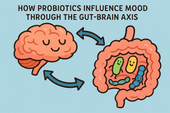
How Probiotics Influence Mood Through the Gut-Brain Axis
Discover how probiotics can do more than support your digestion—they can actually uplift your mood. This article explores the fascinating gut-brain axis and how balancing your gut bacteria through probiotics may help reduce anxiety, improve emotional stability, and support long-term mental well-being. 🌿🧠
-
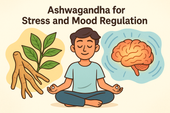
Ashwagandha for Stress and Mood Regulation
Discover how Ashwagandha, the powerful adaptogenic herb 🌿, helps your body manage stress and regulate mood. Learn how it balances cortisol, boosts GABA and serotonin, and supports emotional stability — helping you feel calm, focused, and resilient every day.
-

St. John’s Wort: Natural Support for Mild to Moderate Depression
Discover how St. John’s Wort, the “sunshine herb” 🌼, naturally supports mild to moderate depression. Learn how it boosts serotonin, balances mood, and promotes emotional resilience — with research showing its effectiveness compares to antidepressants, but with fewer side effects.
-
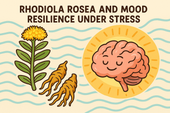
Rhodiola Rosea and Mood Resilience Under Stress
Discover how Rhodiola rosea helps your body adapt to stress 🌿. Learn how this powerful adaptogen balances cortisol, supports serotonin and dopamine, and strengthens emotional resilience — helping you stay calm, focused, and energized under pressure.
-

Chamomile and Lavender: Herbal Calm for Emotional Fluctuations
Discover how chamomile and lavender bring calm to emotional ups and downs 🌿. Learn how these two soothing herbs balance your nervous system, ease anxiety, and support restful sleep — naturally helping you find peace and emotional stability.
-
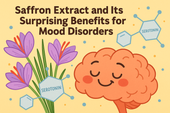
Saffron Extract and Its Surprising Benefits for Mood Disorders
Discover how saffron extract — the golden spice of joy 🌸 — can naturally support mood balance, ease anxiety, and lift mild depression. Learn what science says about its serotonin-boosting power, the ideal dosage, and how this ancient remedy compares to modern antidepressants.
-
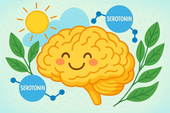
5-HTP and Serotonin: A Natural Path to Lifting Mood
Discover how 5-HTP naturally boosts serotonin 🌞 — the neurotransmitter behind mood, sleep, and emotional balance. Learn how this plant-derived compound supports happiness, reduces anxiety, and improves rest by helping your brain create more serotonin the gentle, natural way.
-

GABA Supplements for Reducing Anxiety and Mood Swings
Discover how GABA supplements can help reduce anxiety and balance mood naturally 🌿. Learn how this calming neurotransmitter works to quiet the mind, ease stress, and improve sleep — plus which nutrients and habits can boost your body’s own GABA production for long-term emotional stability.
-
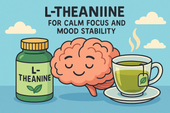
L-Theanine for Calm Focus and Mood Stability
Discover how L-theanine, the calming compound found in green tea 🍵, promotes focus, relaxation, and mood stability. Learn the science behind how it balances neurotransmitters, reduces stress hormones, and enhances clarity — helping you stay centered, calm, and productive without sedation.
-
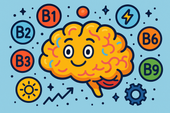
B Vitamins and Brain Chemistry: Supporting Energy and Emotional Balance
Discover how B vitamins power your brain chemistry ⚡. Learn how B6, B9, and B12 support serotonin, dopamine, and energy production — helping boost focus, mood, and emotional balance. From diet to supplements, explore how this vital nutrient group keeps your mind resilient and your energy steady.
-

N-Acetyl Cysteine (NAC) and Mood Disorders: What the Research Says
Learn how N-Acetyl Cysteine (NAC) supports brain health and mood balance 🧠. Discover how this antioxidant helps reduce oxidative stress, regulate glutamate, and improve emotional stability in depression, bipolar disorder, and anxiety — backed by cutting-edge psychiatric research.
-

Supplements for Bipolar Disorder: What May Support Stability
Discover the best supplements for bipolar disorder 🌿 that may support emotional stability and brain health. Learn how nutrients like omega-3s, magnesium, vitamin D, and NAC can help reduce inflammation, balance neurotransmitters, and complement traditional treatment safely.

















































